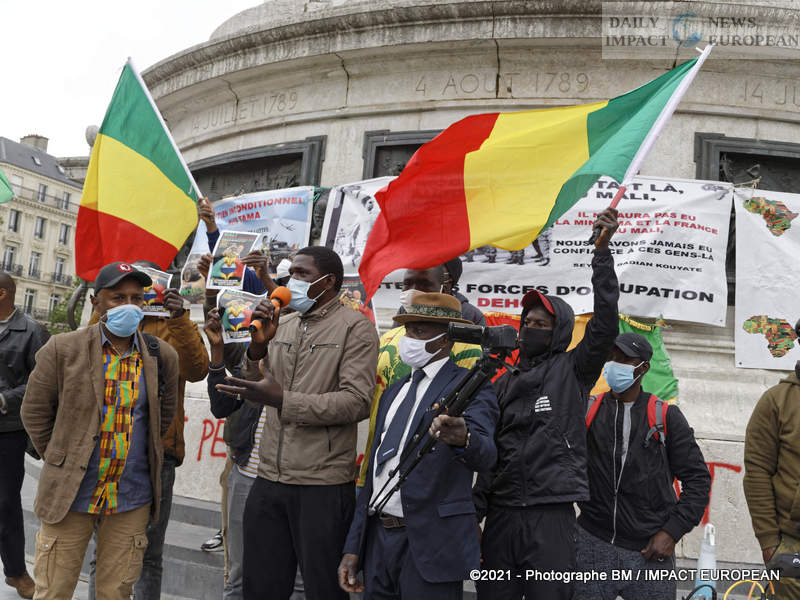A group of the Malian diaspora demonstrated on June 5 in Paris, Place de la République. The participants called for the immediate departure of the French army in Africa. They supported the FAMA (Malian Armed Forces) and regretted President Mobido Keïta. According to them, it would have prevented the presence of France and MINUSMA (United Nations Stabilization Mission in Mali). The latter is made up of 29 countries in Europe, Africa, the Middle East and Asia.
Mali: a country where coup d’etat follow one another
Mali is a West African state, bordering Mauritania to the west, Algeria to the north-northeast, Niger to the east, Burkina Faso and Côte d’Ivoire in the south-southwest, Guinea in the southwest and Senegal in the west-southwest. Former French colony of French Sudan, it became independent on September 22, 1960.
In 1968, a group of officers led by Moussa Traoré overthrew Mobido Keita and established a dictatorship. In March 1991, Amadou Toumani Touré overthrew Moussa Traoré and reinstated democracy after a period of transition. The elections then install Alpha Oumar Konaré in 1992, he will be reelected in 1997.
General Amadou Toumani Touré was elected President of the Republic of Mali in 2002, and re-elected in 2007. In March 2012, a putsch, led by Captain Amadou Haya Sanogo, overthrows him. Ibrahim Boubacar Keïta became President of the Republic in September 2013; he will be re-elected in 2018 after a contested election. In August 2020, a military coup overthrows him in turn. He is replaced by Assimi Gaïta after the resignation of the Prime Minister and the transitional president, Bah N’Daw.
French interventions
Since 2012, following the Libyan war, violence has persisted in the Sahel countries, mainly because of attacks linked to the insurgency of pro-Azawad jihadist and pro-Azawad pro-independence groups.
As a consequence of the Libyan civil war, after the overthrow of the Gaddafi regime, Tuareg mercenaries in the service of the Libyan Arab Jamahiriya fled to the Sahara and joined rebel movements (MNLA, Ansar Dine, AQMI and MUJAO). claimed hundreds of lives and hundreds of thousands of refugees.
SERVAL operation
In January 2013, after the jihadist attack on Ségou and Mopti, France went to war with Operation SERVAL, under UN mandate
. Several African ECOWAS countries are at his side within the framework of MISMA (International Support Mission in Mali). After the rout of the jihadists, the guerrillas laid mines and carried out attacks. In June 2013, the Malian transitional government and the rebels of the MNLA, the HCUA and the MAA signed a ceasefire. A month later, the Malian authorities organize the presidential election in the north of the country.
For its part, the UN takes over from MISMA and sets up MINUSMA, while the European Union engages the European Union training mission in Mali.
In March 2014, Jean-Yves Le Drian declared « the end of the war for the liberation of Mali ». However, the fighting continues.
Operation BARKHANE
On July 13, 2014, the French Minister of Defense Jean-Yves Le Drian announced the end of Operation Serval. Implementation on August 1 of Operation Barkhane, which aims to fight against armed jihadist Salafist groups throughout the Sahel region. The UN has extended the mandate of the mission in Mali (Minusma) until June 2015.
In Mali, the French operation Barkhane covers an area twice the size of France. Between the Sahel and the Sahara, from Chad to Mauritania, Barkhane extends over an area the size of Europe. To date, there are 5,100 French soldiers in the Sahel to fight against jihadism.
On June 10, 2021, Emmanuel Macron announced the upcoming end of the Barkhane military operation in the Sahel. French troops will give way to an « international force » whose composition remains to be determined.
« Clear » commitments on the part of the transitional authorities (No dialogue with the jihadists) are the conditions for resuming mixed military operations with the Malian forces.
This « transformation » will involve the closure of French army bases. It gives priority to the fight against jihadists by special forces. This new phase will involve the internationalization « of the combat support effort of local, under-equipped and under-trained forces.
France is banking on the rise of the group of European special forces Takuba, which it initiated (600 men, half of them French, as well as a few dozen Estonians and Czechs and nearly 140 Swedes). Italy has pledged up to 200 soldiers, Denmark 100. This is also the case for several other countries, including Greece, Hungary and Serbia. The objective is to reach 2,000 men on Takuba, including 500 French, alongside the Sahelian soldiers.
Death of an AQIM chief
This June 11, the Minister of the Armies, Florence Parly announced the death of a leader of Al-Qaeda in the Islamic Maghreb (AQIM). Force Berkhane killed Baye ag Bakabo, responsible for the deaths of RFI journalists Ghislaine Dupont and Claude Verlon in November 2013.
This announcement follows the statement of the President of the Republic, mentioning the in-depth transformation of Operation Berkhane.
Views: 0











More Stories
Phenom 300E: The World’s Leading Light Jet for 14 Consecutive Years
Art Capital, 20 Years Already
Chers Parents Premieres in Paris